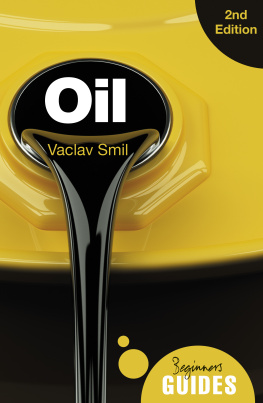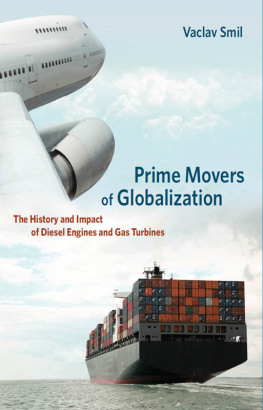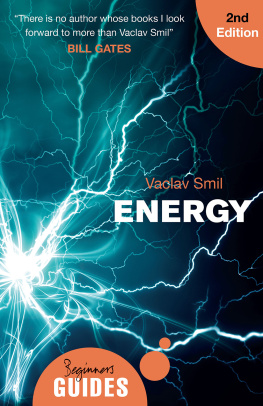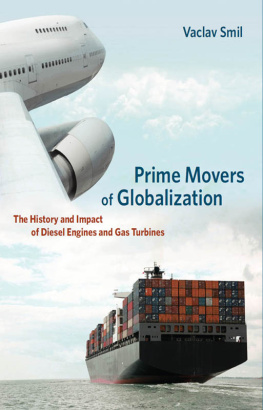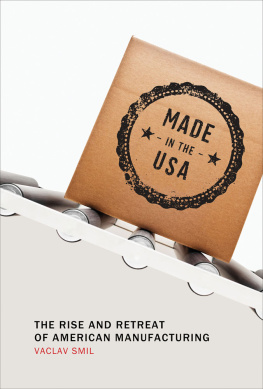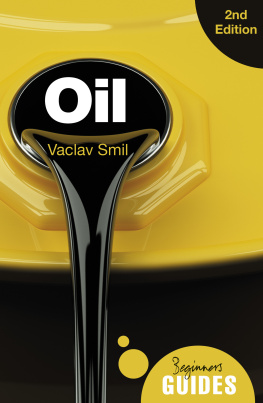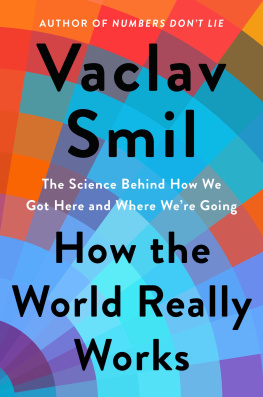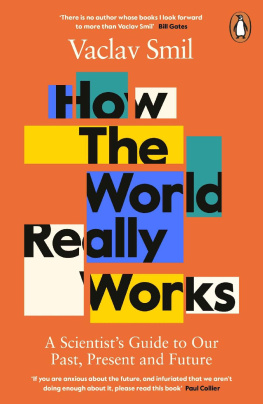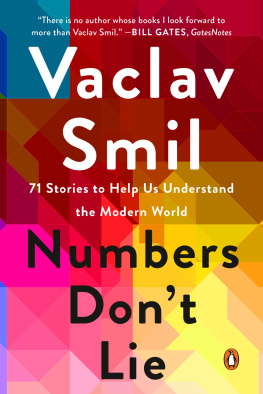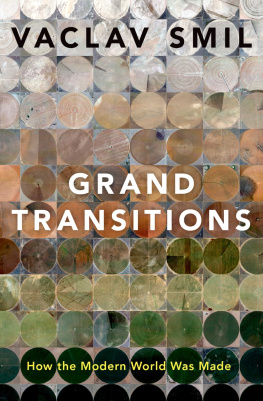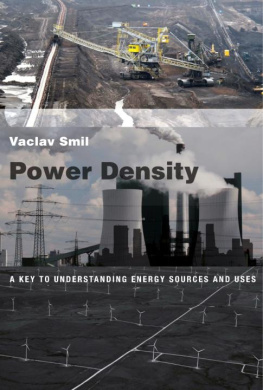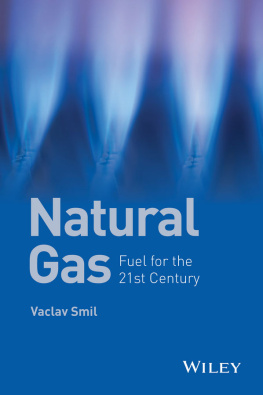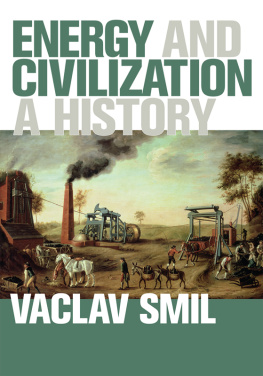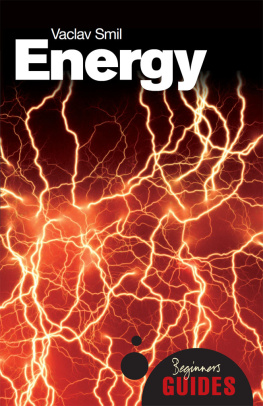


Contents
Few short periods in the history of the oil industry have been as eventful as the one that followed the publication of this guides first edition in 2008. The intervening developments have gone far beyond new rounds of oil price rises and collapses: there have also been notable technical advances in oil production, new economic realities affecting both major oil-producing and oil-consuming countries, and shifting perceptions of the global environmental prospects. This new edition preserves what has remained durable and fundamental, and updates the contents by including all notable post-2007 developments. The latest available data were always used, which means that most of it is carried through to 2016, while some coverage ends in early 2017. The new edition also takes a closer look at some key changes affecting the oil industry and oils place in the modern world, above all at the recurrent peak oil claims, at the great American oil renaissance and the purported end of oil (leave in the ground sentiment) due to the necessity of accelerated decarbonization of the global energy supply required to prevent catastrophic global warming.
The overall approach has not changed: much like my republished book on energy, this brief book is not a guide for the beginner in the strictest sense. In both cases, a certain amount of basic scientific understanding (above all reasonable numeracy) is essential. The minimum entry-level for this book could be specified as an equivalent of the North American high school education; a year or two of university studies (no matter in what subject) would make for an easier read but, as always, it is not formal qualifications but individual interest, inquisitiveness and willingness to learn that matter most. From that point of view readers who could profit from this book range from true beginners to people who know a great deal about a specific segment of the vast oil-centered enterprise but who would like to learn more about other aspects of this inherently interdisciplinary subject of scientific inquiry.
The book teems with numbers (I am sure too many for some tastes) but I make no apologies for this: real understanding of oils origins, geology, exploration, extraction, transportation, processing, use and linkages to society and the environment can come only by appreciating the magnitudes of specific time spans, depths, volumes, durations, rates, cumulative totals, concentrations, prices, subsidies and costs that define and govern this vast global endeavor. As for the multitude of technical terms, I have tried to explain them (however briefly) whenever they are first used. All units and their abbreviations are listed in Appendix A, and Appendix B offers a dozen books for additional reading and a small selection of highly informative websites.
Revising the text was as enjoyable as writing the original, but, again, it was not particularly easy because for every interesting bit of information, for every number and for every conclusion that I have included I had to leave out several times that number of fascinating facts, explanations and useful asides pointing in unexpected directions. Squeezing the universe of oil into no more than 60,000 words of text remained an unending exercise in truncation and exclusion. And although this does not excuse all omissions and imperfections of the book, I ask both the experts (who might be incensed by the absence of matters they would have considered essential) and the true beginners (who would have wished for more extensive explanations) to keep in mind the fundamental restriction under which I had to labor. Finally, my thanks to Shadi Doostdar for giving me another opportunity to revisit the fascinating world of oil, and to Bounce Design for preparing the graphics.
If history is seen as a sequence of progressively more remarkable energy conversions then oil, or more accurately a range of liquids produced from it, has earned an incomparable place in human evolution. Conversions of these liquids in internal combustion engines have expanded human horizons through new, and more affordable, means of personal and mass transportation. Anybody with a car in a country with decent highways can travel more than 1,000km in the course of one day (in Europe this could easily entail driving across four countries). Any city with a runway long enough to accommodate large jets can now be reached from any other city on the Earth in less than twenty hours of flying time, and for many people trips to Bali or Mauritius have become nearly as common as those to Birmingham or Munich. Liquid fuels have created new landscapes of concrete and asphalt highways, overpasses, parking lots, shopping megacenters and seemingly endless urban sprawl.
Private cars also allow for unprecedented quotidian personal mobility. They make it easy to buy imported foodstuffs in a store at the other end of a town or to drive, on the spur of the moment, to a restaurant, symphony concert or a football game. They make it possible to live far away from a place of work, to set ones own schedule during vacation drives, to spend free time far from home fishing or inside a garage installing monster engines and wheels or minutely reconstructing vintage car models.
Liquid fuels, through the combination of fast and massive container ships and eighteen-wheeler trucks, have brought us Chilean apricots and South African grapes in January and ginger or green beans from China or Kenya all year round. Liquid fuels have also helped to rationalize productive processes ranging from farming to retailing, changes that include such remarkable organizational feats as the just-in-time delivery of goods (where large assembly plants carry no extensive and expensive inventories and receive their parts by truck and train just when needed) and such profound macroeconomic changes as the globalization of manufacturing, where everything seems to be made (or assembled) many time zones away.
Modern life now begins and ends amidst the plethora of plastics whose synthesis began with feedstocks derived from oil because hospitals teem with them. Surgical gloves, flexible tubing, catheters, IV containers, sterile packaging, trays, basins, bed pans and rails, thermal blankets and lab ware: naturally, you are not aware of these surroundings when a few hours or a few days old, but most of us will become all too painfully aware of them six, seven or eight decades later. And that recital was limited only to common hospital items made of polyvinylchloride; countless other items fashioned from a huge variety of plastics are in our cars, aeroplanes, trains, homes, offices and factories.
But if the new oil-derived world has been quasi-miraculous, enchanting and full of unprecedented opportunities, it has been also one of dubious deals, nasty power plays, protracted violence, economic inequalities and environmental destruction. Ever since its beginnings, the high stakes of the oil business have attracted shady business deals (from J. D. Rockefellers Standard Oil to Mikhail Khodorkovskys ill-starred Yukos) and begat some questionable alliances (be it the US and Saudi Arabia or China and Sudan). Oil ownership and the riches it provides have empowered dictators (from Muammar al-Gaddf to Saddm Hussein), emboldened autocrats (Vladimir Putin and the late Hugo Chavez being among the prominent examples), financed terrorists (including the murderous activities of al-q ida and d ish , the self-proclaimed Islamic State of Iraq and the Levant), encouraged massive corruption (be it in Nigeria or Indonesia, Russia or Malaysia), promoted ostentatiously excessive consumption (practiced by the legions of Saudi princes as well as by new Russian oligarchs), engendered enormous income inequalities and done little for personal freedoms and the status of women.

